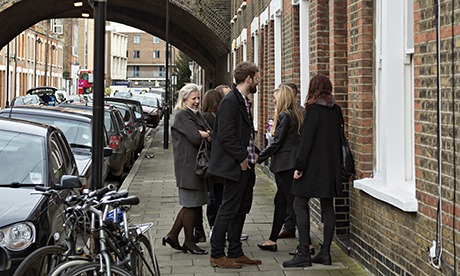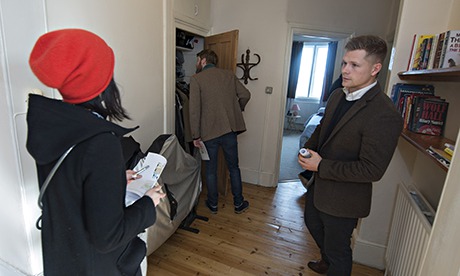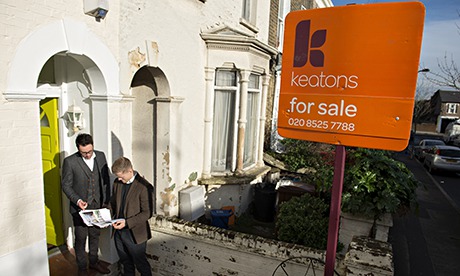There is an awkward moment when estate agent Rory Atkins opens the door to a two-bedroom ground floor flat, hidden behind a discouraging cafe, to reveal a dark corridor where he finds three brown spirals of dog excrement on the carpet. "It's not ideal. He's done a little mess," he says apologetically, stepping over the droppings and leading the potential buyer, who is already looking downcast, into the kitchen.
It is not a positive viewing. The hopeful buyer is quickly realising how little she can afford in a part of London where she has lived for the past decade. This flat, which is marketed as having a bright, secluded courtyard garden, has a tiny, dark patch of paved external space, barely wide enough to stretch out your arms. The tenant, who has left her spaniel alone in the flat, has discarded belongings on every surface, leaving an explosion of tangled clothes, odd boots, bottles of hair dye, socks, sunglasses, loo-paper rolls, DVDs, all thrown on to the bed and the floor. ; it is a scene of unusually intense squalor.
For a while the buyer tries to be positive and cranes to see the flat's potential, but is ultimately defeated by the bedroom that has no windows. The flat (described as an "ideal first-time purchase or rental investment") is not close to any tube or railway station, but is priced at £299,000.
The average cost of a home in the east London borough of Hackney exceeded £500,000 for the first time in December, as the area recorded the steepest year-on-year rise in prices in England and Wales last year. But a similar trend can be seen across London and the south-east. This week, forecaster Ernst & Young warned that "bubble-like" conditions were emerging in London, with prices in the capital up 11.6%, year-on-year in November, over double the national average rise of 5.4%. For people trying to buy somewhere to live, the new price surge makes house hunting an exceptionally stressful process, as three days spent with a Hackney-based estate agency reveals.
"It's a nightmare," the prospective buyer says. She examines a red bucket placed under a skylight and considers whether it is there to catch a leak. "I've been living in Hackney for 10 years. When I moved here I paid £350 a month in rent, now I pay £1,000. It's not sustainable to live in rented accommodation."
She wonders if the price is "a bit ambitious", but Atkins explains the flat has already had a sale agreed at around the asking price before Christmas, but the sale fell through. She says she will think about it. "It's about working out if I could live in a place which doesn't have any windows." Within a week, estate agents have found another buyer who is happy to pay an undisclosed sum, only a little below the asking price.
House price rises in London are nothing new, but the sharp increase in Hackney in the last year has startled agents, buyers and sellers. The process of buying somewhere to live here has become increasingly anguished, particularly for first-time buyers, coming into the market with nothing of their own to sell. Local agents now find it more efficient to sell houses by organising open days on Saturdays, when dozens of potential buyers are shepherded through the doors, during two-hour-long appointment windows, and encouraged to make their minds up by Monday morning.
On the last Saturday in January, Keatons, a London agents with a large Hackney office, organised seven open house viewings. By Monday night, buyers had been found for four of them, and offers had been made on two more, leaving only one flat with no instant buyer, but several second viewings arranged.
Open days feel particularly fraught at the (relatively) cheaper end of the spectrum, where the level of anxiety is acute. Thirty-five separate viewings have been booked, beginning at midday on Saturday, for a sunny but otherwise unremarkable two-bedroom top floor mansion block flat, overlooking a main road and on the market at £400,000.
Potential buyers brush past each other, politely, tapping at the fireplaces, scraping their nails suspiciously over the plaster, peering into cupboards and listening to the creaking floorboards; couples retreat to the corners to mutter at each other. It feels like an uncomfortable drinks party, guests crushed in but reluctant to make conversation, studying the decor in awkward silence.
Everyone who comes in is white, and in their late 20s and 30s, unless they are older parents accompanying their children; this demographic is repeated at each of the nine viewings and open days that Keatons allows us to attend over three days.
Housebuying angst in Hackney is a uniquely middle-class phenomenon. Research released by HSBC this week showed that of first-time buyers who bought in 2012, 64% received financial help from their parents. Hackney agents say parents, helping their children with a lump sum to get them on the ladder, are partly responsible for the sharp price rise.
 Agents insist that open days are a practical and efficient way of dealing with the rising demand. Photograph: Christian Sinibaldi for the Guardian
Agents insist that open days are a practical and efficient way of dealing with the rising demand. Photograph: Christian Sinibaldi for the Guardian
Tarik Ali, another Keatons agent, says all his buyers are "relatively affluent, middle class people". "They're often supported by the bank of mum and dad; they may have an inheritance or parents who have remortgaged the equity on their house," he say. "Parents who have got large savings are giving money to their children to help them get on the ladder, because they are not getting any interest on their savings."
There is a mood of despondent resignation, shared by most buyers, trooping to the viewings. Rebecca Scott, 29, a fashion designer, who has her parents with her for moral support, thinks she has seen about 20 places already. "It's depressing. You think that it is going to be fun looking for your first place to live, but it's more like a chore," she says.
Like many, Chloe Pursey, 28, a digital publisher, wonders if the open house policy is designed to "freak you out". "It's like making people queue outside a nightclub to make you feel it's popular. You feel you have no option but to put in your highest offer." She is bemused by the number of cash buyers. "Where are all these people coming from with £575,000 in their pocket?"
Jenny Howard, 35, who works in advertising, agrees: "It is a game so that you panic. You're made to feel that you have about four minutes to decide whether to drop half a million pounds. It's clever psychology to make you think, 'if there are lots of people here, it must be nice'. It's easier for the agents – this way they don't have to do appointments and drive you around."
By the end of the session, the two Keatons estate agents who have been guiding people in and out think that at least two people will pay the asking price. In the end, five offers are made on Monday, ranging from £405,000 to £454,000.
The agents insist that open days are a practical and efficient way of dealing with the rising demand, pointing out that most buyers are busy during the weekdays, and at this time of year it is too dark to look at houses properly after work. It also works well for sellers, because the process of selling a house is speeded up. "While the market is so barmy, so many owners want us to release their houses for open days on Saturday," head of Keatons' Hackney office, Debby Blow, explains.
There is a persistent refrain of defensiveness from the estate agents, who point out repeatedly that they are not responsible for rising prices, but are simply witnessing the fallout from the fundamental problem of a shortage of stock in London. However, Blow admits that the consequence of these open days, which so often lead to multiple offers made on a Monday, and then sealed bids, decided on Tuesday, is that people are paying over the odds for the available property, and then, when their purchase goes through, instantly setting a new standard for prices in the area, further inflating the boom.
"The sealed bids scenario is very worrying," she says, although she thinks the system is a more sensible way of resolving competing bids than the gazumping she witnessed five years ago. She doesn't enjoy overseeing the process.
"It is hugely emotional. People think this market is amazing, but when you have five offers on a property, you end up with one delighted person and four devastated people. Buyers have got used to it. Every agent does sealed bids now," Blow says. "It is great for the vendor, except they have to go through the same process when they buy their new home."
She puts the micro-boom in Hackney down to the post-Olympics changes that have transformed an area which once had failing schools and high crime into a part of London appreciated for its architecture, parks and cafes, but which remains just affordable to people no longer able to live more centrally. People no longer able to afford in this part of east London are looking further out in Walthamstow and Leyton. "We are not pushing the prices up: the buyers are, while demand outweighs supply," she adds.
 On the last Saturday in January, Keatons, an agents with a large Hackney office, organised seven open house viewings. Photograph: Christian Sinibaldi for the Guardian
On the last Saturday in January, Keatons, an agents with a large Hackney office, organised seven open house viewings. Photograph: Christian Sinibaldi for the Guardian
Eighteen people are booked to see a basement and ground floor three-bedroom flat, with limited natural daylight downstairs, priced at £550,000. Liane Wimhurst, 32, a journalist, has been searching on and off for two years with her husband, and makes her way swiftly around with a practised air. They are first-time buyers, both in good jobs, helped with a generous lump of money from family members, but have found the process very difficult, and are constantly moving their search area away from the stretch of north London they originally hoped to live in.
"We tried Tufnell Park, but were priced out of there; we were in a bidding war on a couple places in Finsbury Park, but we were priced out of there. We're looking now at places which cost £550,000, when similar properties six months ago were on sale for £400,000. We are flabbergasted. It is difficult to remain positive in a situation like this. The prices that other people are bidding keep taking us by surprise."
She is also concerned about the effect of rising prices on local people, whose rents area rising with property prices. "What about the people who can't afford the rent? Do they get flushed out of the area? The government response is plodding. I don't think they appreciate the scale of the problem." She decides quickly that this flat is not suitable. "£550,000 when half the flat is in darkness? That is not a recipe for happiness."
Flat-searching is a very intimate experience. The owners here have only just gone out, and their bath mat is still wet. Buyers flick through people's lives, glancing at their sofa choices, their duvet covers, the number of books they own and how recently handled they are, you gauge how ambitious they are in the kitchen. Jon Clifford, 34, quite likes the flat, but is gloomy about the price. "I mean, it's high … isn't it? It's very high." Still, he knows that this is not a time for uncertainty. "We dawdled on a place before, and it was gone before we made up our mind."
He knows he is in a relatively good position because his own flat has been valued at around 60% higher than the price he bought it for three years ago, but he also feels embarrassed at his own role in the gentrification process of the area he likes. "Where do the locals go? The pubs have gentrified. It's the speed – it's all happened so fast it's ridiculous. You feel like you're part of the process."
As he talks, another couple look around; they don't want to be interviewed about their house hunt, which has already involved making seven offers, and having seven bids refused, because it makes them too unhappy and angry. There are 24 viewings at a recently decorated two-up two-down three bedroom house, on sale for £730,000. The first viewer is rueful about the price. "This used to be called Murder Mile. Its brand has totally changed – there's a creperie up the road, but the transport is still shocking."
Lizzy Moore, 38, a graphic designer, who is here with her two small children and husband, searching for somewhere bigger now their youngest has turned one, is sure she saw the same house advertised for sale a year ago for £650,000. "It's depressing. I don't find this a joyful experience," she says, jaundiced by the experience of searching. "The games they play, causing a frenzy with these viewings. It's embarrassing. But the price? It's probably the going rate – I've watched Clapton go from being affordable to being unaffordable." Three mournful tenants, who will have to leave once the house is sold, sit in the kitchen, listening to jazz, watching people trailing through their home.
The Keatons' office in Hackney is brightly lit, with marble floors and brand new bright orange chairs. The staff are smartly dressed in black and grey, and appear upbeat and enthusiastic about their job, which is lucky since they work surprisingly hard – starting at 9am and finishing later than 7pm most weekdays, and working every Saturday, with only two days off in lieu a month. The huge glass shop front looks out on to Mare Street, a busy Hackney shopping street, showcasing a part of London which is changing as house prices rise, but which remains hugely mixed.
There is a new dog-walking company around the corner from the offices, and all day pairs of dog minders in green overalls walk dogs, three at a time, to the park. But there are also a lot of older people dragging shopping trolleys, people with unsteady gait who look unwell, humped over walking frames or squeezed into mobility vehicles, and people flimsily-dressed for the January cold.
These are not people you would see walking down a high street in Kensington. This is the odd thing about the housing boom in Hackney: remarkable prices are being asked for houses that are in areas of the city that still feel quite poor. An elderly man, carrying a clear Tesco's bag full of bleach bottles, stops to look at the houses advertised in the window, pauses for a while, frowns, and moves on.
The speed of change here is extraordinary. Blow, who has worked for the branch for 13 years, has seen the transformation. "That kind of dog is new in our borough," she says, looking at the uniformed dog-walkers going past. "A few years ago the dogs were muzzled – pit bulls … now we have dachshunds. People who are working take their dog to the dogminder, like you'd take a child to the childminder – that's new."
She is glad that Hackney is no longer seen as crime-ridden, that the schools have improved so much that her customers do not think about moving when their children turn eight or nine, and that there are more cafes and restaurants, but she is also ambivalent about how quickly it has happened, and how many of the longer-term residents are moving on.
A woman in a striped woolly hat and trainers comes in for some advice on whether to sell her flat in Stoke Newington, now that the area has, as she puts it, "done its thing" (ie appreciated insanely), to invest the money in an area which has not yet gone up in value. "Should I sell and buy in Walthamstow where there's going to be a higher increase? Or is that crazy? We want to get a period property, do it up, and flip it."
The office has about 50 properties on its lists. What is remarkable when you flick through the printed details is how little you get for the large amount being asked. The cheapest flat is a £130,000 postage stamp-sized bedsit above a shop – 13.7 square metres.
The most expensive home the office is selling is a Victorian house for £1.5m. It is described as "magnificent", but the pictures show a corner building in a dismaying state of disarray. It has damp-wrinkled carpets and ripped purple curtains, the top floor ceiling has collapsed, revealing rib-like wooden struts, and a huge, grimy, white fluffy duck lies among the old children's toys abandoned on the floor.
Only 15 people are booked to see the final viewing of the day – a neat, flat-fronted two-storey Victorian terraced home, near London Fields – £875,000. A buyer who has flown in from New York to see the house is unflustered by the price and by the crowded viewing conditions. "It's fine to look with lots of other people. You just have to pretend you don't like it," he says. In fact he likes the house. "Prices have gone up," he says, "but the quality of life has gone up too. It is more gentrified – there are more vegan cafes."
By noon on Monday, five people have offered the asking price, and Blow requests that they each come back with their best offer by 7pm (sealed bids simply involve an email to the agent). A few hours later the owner of the house has accepted an offer of £927,000 from a chain-free cash buyer. That is £52,000 above the asking price.
This article was amended on 7 February 2014 to correct a reference to 7pm, from 7am as the original said.



